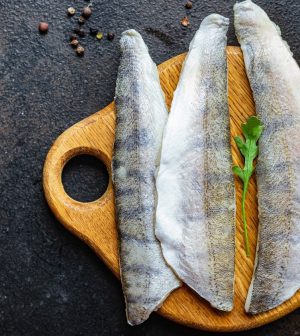- Could Your Grocery Store Meat Be Causing Recurring UTIs?
- Are You Making This Expensive Thermostat Error This Winter?
- Recognizing the Signs of Hypothyroidism
- 10 Strategies to Overcome Insomnia
- Could Artificial Sweeteners Be Aging the Brain Faster?
- Techniques for Soothing Your Nervous System
- Does the Water in Your House Smell Funny? Here’s Why
- Can a Daily Dose of Apple Cider Vinegar Actually Aid Weight Loss?
- 6 Health Beverages That Can Actually Spike Your Blood Sugar
- Treatment Options for Social Anxiety Disorder
Is Mom’s Fish Intake During Pregnancy Linked to Juvenile Arthritis?

Eating fish while pregnant doesn’t appear to increase a child’s later risk of juvenile arthritis, particularly if the fish is oily like salmon, trout or sardines, new research shows.
“We cannot caution pregnant women against consuming fish solely based on this study in regards to [juvenile arthritis] risk, especially considering other research highlighting the positive impacts of a marine diet,” said lead researcher Dr. Vilde Øverlien Dåstøl, a doctoral student with Oslo University Hospital in Norway.
These findings run counter to a 2019 Swedish study that found up to a five-fold increased risk of juvenile arthritis among children whose mothers ate fish at least once a week during pregnancy, the Norwegian researchers noted.
For the new study, they followed more than 73,800 Norwegian women who were pregnant between 1999 and 2008. Among the children they birthed, there were 218 cases of juvenile arthritis.
As part of another larger research effort, the women were quizzed on their diet during the first half of pregnancy.
Average total fish intake per week was 218 grams, or more than 7 ounces, researchers said.
No clear links were observed between juvenile arthritis and either total fish consumption or consumption of oily fish, researchers noted.
However, researchers did find a weaker link between juvenile arthritis and high consumption of lean or semi-oily fish like tilapia, cod or flounder.
“We found increased odds of [juvenile arthritis] when the maternal intake exceeded 252 grams of lean or semi-oily fish per week compared with low intake,” Øverlien Dåstøl said, “but the magnitude of our effect estimates was substantially smaller than the Swedish study.”
The earlier Swedish study also had speculated that the increased risk of juvenile arthritis could be caused by increased exposure to heavy metals found in seafood.
But the new Norwegian study found no association between the estimated dietary mercury exposure from women’s fish intake and their children’s subsequent risk for juvenile arthritis.
Researchers presented the findings Friday at the annual meeting of the European Alliance of Associations for Rheumatology in Vienna.
“We found no association between total fish consumption or estimated dietary mercury exposure and [juvenile arthritis],” Øverlien Dåstøl said in a meeting news release.
More information
The Arthritis Foundation has more about juvenile arthritis.
SOURCE: European Alliance of Associations for Rheumatology, news release, June 14, 2024
Source: HealthDay
Copyright © 2026 HealthDay. All rights reserved.










